
Clarin-1 is a protein that in humans is encoded by the CLRN1 gene.

The Abelson helper integration site 1 (AHI1) is a protein coding gene that is known for the critical role it plays in brain development. Proper cerebellar and cortical development in the human brain depends heavily on AHI1. The AHI1 gene is prominently expressed in the embryonic hindbrain and forebrain. AHI1 specifically encodes the Jouberin protein and mutations in the expression of the gene is known to cause specific forms of Joubert syndrome. Joubert syndrome is autosomal recessive and is characterized by the brain malformations and mental retardation that AHI1 mutations have the potential to induce. AHI1 has also been associated with schizophrenia and autism due to the role it plays in brain development. An AHI1 heterozygous knockout mouse model was studied by Bernard Lerer and his group at Hadassah Medical Center in Jerusalem to elucidate the correlation between alterations in AHI1 expression and the pathogenesis of neuropsychiatric disorders. The core temperatures and corticosterone secretions of the heterozygous knockout mice after exposure to environmental and visceral stress exhibited extreme repression of autonomic nervous system and hypothalamic-pituitary-adrenal responses. The knockout mice demonstrated an increased resilience to different types of stress and these results lead to a correlation between emotional regulation and neuropsychiatric disorders.

Centrosomal protein of 290 kDa is a protein that in humans is encoded by the CEP290 gene. CEP290 is located on the Q arm of chromosome 12.

McKusick–Kaufman/Bardet–Biedl syndromes putative chaperonin is a protein that in humans is encoded by the MKKS gene.
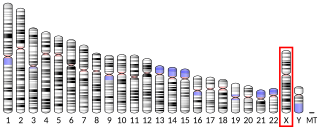
Oral-facial-digital syndrome 1 protein is a protein that in humans is encoded by the OFD1 gene.
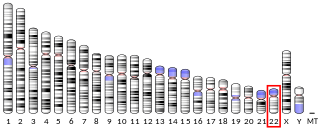
TRIO and F-actin-binding protein is a protein that in humans is encoded by the TRIOBP gene.

Inversin is a protein that in humans is encoded by the INVS gene.
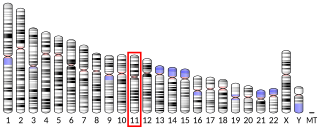
Bardet–Biedl syndrome 1 protein is a protein that in humans is encoded by the BBS1 gene. BBS1 is part of the BBSome complex, which required for ciliogenesis. Mutations in this gene have been observed in patients with the major form of Bardet–Biedl syndrome.

Eyes absent homolog 4 is a protein that in humans is encoded by the EYA4 gene.
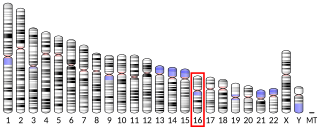
Bardet–Biedl syndrome 2 protein is a protein that in humans is encoded by the BBS2 gene.

Coiled-coil and C2 domain-containing protein 1A is a protein that in humans is encoded by the CC2D1A gene.

Nephrocystin-3 is a protein that in humans is encoded by the NPHP3 gene.

Proline/serine-rich coiled-coil protein 1 is a protein that in humans is encoded by the PSRC1 gene.

Meckelin is a protein that in humans is encoded by the TMEM67 gene.

Tetratricopeptide repeat domain 8 (TTC8) also known as Bardet–Biedl syndrome 8 is a protein that in humans is encoded by the TTC8 gene.

Bardet–Biedl syndrome 10, also known as BBS10 is a human gene.
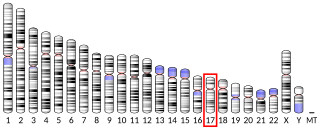
Meckel syndrome, type 1 also known as MKS1 is a protein that in humans is encoded by the MKS1 gene.

Transmembrane protein 216 is a protein in humans that is encoded by the TMEM216 gene.

ADP-ribosylation factor-like protein 13B (ARL13B), also known as ADP-ribosylation factor-like protein 2-like 1, is a protein that in humans is encoded by the ARL13B gene.

Coiled-coil domain containing 8 is a protein that in humans is encoded by the CCDC8 gene.

















